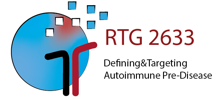Ass. A11: Deciphering the molecular impact of aging on the development of autoimmunity and autoimmune diseases
Autoimmune diseases predominantly emerge in later stages of life, but the mechanisms linking aging to their development remain insufficiently understood. In aged C57Bl/6J mice, we observed increase in anti-nuclear antibodies (ANA), with 2/8 mice over 10 months and 7/10 mice over 18 months showing elevated titers—while none were found in young controls. Remarkably, two of the ANA-positive older mice developed autoimmune pancreatitis, a condition previously only described in auto-immune prone mice. These findings suggest that age itself may drive autoimmune pathology in otherwise non-prone strains. While age-related changes in T cell function are well documented, the role of altered kinase signaling in aging and autoimmunity remains underexplored. Using PamGene™ chip-based kinome analysis, we identified several age-related kinase activity changes in pancreas and liver, including regulators of immune response and cellular senescence such as ZAP70, ephrins, PKA, PKC, and PKG. Our ongoing research aims to elucidate how local kinase activity shifts contribute to age-associated autoimmunity. We will integrate kinomic profiling, immune cell phenotyping, and tissue-specific analyses to identify key signaling pathways involved. This work has the potential to uncover novel targets for intervention in age-related autoimmune diseases by linking molecular aging processes to immune dysregulation.

- Projects
- 1st Generation
- 2nd Generation
- A: Defining Autoimmune Pre-Disease
- B: Targeting of Autoimmune Pre-Disease
- Associated projects
- Ass. A9: Impact of kinases on mucous membrane pemphigoid pathogenicity
- Ass. A10: Understanding the role of dipeptidyl peptidase-4 inhibitors in pemphigoid diseases
- Ass. A11: Deciphering the molecular impact of aging on the development of autoimmunity and autoimmune diseases
- Ass. B2: Nutrition as a therapeutic strategy in autoimmunity: Targeting IgG glycosylation
- Ass. B3: Pharmacological inhibition of signaling pathways in an adult mouse model of pemphigus vulgaris
- Medical doctoral researcher projects
- Concluded projects
Doctoral researcher

Participating Researcher


Mentor



